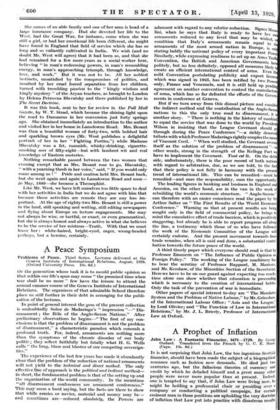A. Peace Symposium
(Oxford University Press. lOs. 8d.) OF the generation whose task it is to mould public opinion so that within our life's span may come " the promised time when war shall be no more " few have the leisure to attend the annual summer course of the Geneva Institute of International Relations. The organizers of that admirable School therefore place us still further in their debt in arranging for the publi- cation of the lectures.
In point of general interest the gem of the present collection is undoubtedly Seilor de Madariaga's " impression "—" Dis- armament ; the ROle of the Anglo-Saxon Nations." After preliminary observations he begins—" The first of my con- clusions is that the problem of disarmament is not the problem of disarmament," a characteristic paradox which conceals a profound truth. For, indeed, armaments are nothing more than the symptoms of the chronic disorder of our body politic; they reflect faithfully but fatally what H. G. Wells calls " the brag, blare and bluster of our competing sovereign- ties."
The experience of the last few years has made it abundantly clear that the problem of the reduction of national armaments will not yield to the technical and direct method. The only effective line of approach is the political and indirect method— in short, the fundamental problem is that of the setting up and the organization of the world community. In the meantime "all disarmament conferences are armament conferences." This may seem a hard saying, but the facts are there to show that while armies or navies, material and money may be— and sometimes are—reduced absolutely, the Powers are
adamant with regard to any relative reduction. Signor Af lini, when he says that Italy is ready to have her armaments reduced to any level that may be wished, condition that Italy's armaments remain equal to t armaments of the most armed nation in Europe, is oat stating baldly the national policy of every important Pow Similarly, while expressing readiness to set up an Arms
Convention, the British and American GovGovernmentspolitely, but no less definitely, opposed hav
all measures likely create an efficient international control of arms. Even t mild Convention postulating publicity and export lice which was signed in 1925, has been ratified by two Powe only, France and Venezuela, and it is still held up pe agreement on another convention to control the menu of arms, which has so far defeated the efforts of the Govern meats in conference at Geneva.
But if we turn away from this dismal picture and eonside the indirect method and the contribution of the Anglo-Sax nations to this the only true road to disarmament, it another story. " There is nothing in the history of man to equal the service that was done to the world by Presides Wilson in insisting that the League Covenant should through during the Peace Conference "—a richly dewy ' tribute with which Professor Madariaga rightly couples the nun of Viscount Cecil. " When well studied, the Covenant revea itself as the solution of the problem of disarmament "—' other words, strong in the strength of the Kellogg Pact w have to implement the Covenant. Tout eat /a. On the debi side, unfortunately, there is the poor record of both natio with regard to arbitration, due, as we are told, to the far that their policy is not fully in harmony with the presen trend of international life. This can be remedied—must remedied—and ours the responsibility, ours the opportunity The leading figures in banking and business in England and America, on the other hand, are in the van in the work o rebuilding the world's economic structure. " Anglo-Saxons can therefore with an easier conscience read the paper by S' Arthur Salter on " The First Results of the World Economic Conference." Warning us that at present results are being sought only in the field of commercial policy, he brings to mind the cumulative effect of trade barriers, which is positively staggering, but already he is able to report progress all along the line, a testimony which those of us who have followed the work of the Economic Committee of the League will certainly endorse. And the present movement towards freer trade remains, when all is said and done, a substantial contri- bution towards the future peace of the world.
A third timely paper which everyone should read is that by Professor Zimmern on " The Influence of Public Opinion on Foreign Policy." The working of the League machinery has to bear the scrutiny of Professor Rappard, M. Mantoux, and Mr. Kershaw, of the Minorities Section of the Secretariat. Here we have to be on our guard against expecting too much; time alone can show whether that education is proceeding which is necessary to the creation of international habits. Only the task of the prevention of war is immediate.
Other papers of special interest to-day are " The Mandato System and the Problem of Native Labour," by Mr. Grimshaw, of the International Labour Office ; "Asia and the League, by Lord Olivier; and "The Function of Law in International Relations," by Mr. J. L. Briefly, Professor nf International Law at Oxford.


















































 Previous page
Previous page